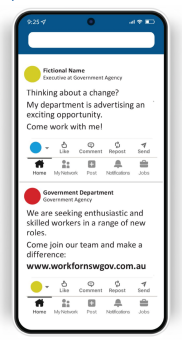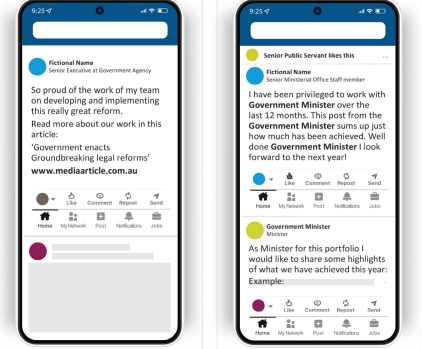Should you (a) post about your agency’s’ work on personal social media accounts? (b) Is is ok to ‘like’ or share comments about your agency? (c) What are the pitfalls around sharing advertised job roles? (d) Should you promote the work your agency is doing on social media? (answers at the end of this story!)


The NSW Ombudsman has released a paper in response to the increasing activity of government departments, public sector agencies and local councils across social media channels like Facebook, LinkedIn, Twitter, Instragram and YouTube.
The paper notes the use of social media in the public sector can be a good tool for communicating messages and driving engagement. However, when used wrongly, it can cross over to misconduct and maladministration.
The paper covers what’s lawful and reasonable, the line between official and non-official use of social media, managing comments and interaction, and risks to the impartiality of public servants acting as ‘brand advocates’ for their agencies.
“Our purpose in this paper is to encourage public servants and agencies to discuss and think carefully about their activities on social media, and to help them recognise some of the issues and risks, “ it says.
Access Avoiding pitfalls when agencies and public servants use social media here.
Answers (source: NSW Ombudsman)
a)If the head of an agency or division sees it as important to be active on social media with their own ‘voice’ … and they are appropriately authorised by the agency to do so, then then they should recognise that the account of a head of agency or division is, like that of an agency, an official account. This would make it clear, for example, that agency policies, state records and GIPAA requirements apply.
b)If junior public sector employees simply ‘like’ or ‘share’ without substantive commentary posts made by their agency then this will be generally low risk. However ‘likes’ by a senior executive may be perceived as political.
c) If sharing an advertised role, it’s important to ensure that the post doesn’t undermine the perceived independence of the appointment process, such as by suggesting that the person appointed would work for a particular executive.
d) Public servants should be cautious about using their social media to promote the things they or their agency are doing, and recognise that the danger of not appearing fully apolitical can arise just as much from praise, as it can with criticism. If it would not be ok to say ‘I am ashamed to have worked on this government policy’, then the safest course would be to assume it may also not be ok to say ‘I am proud to have worked on this policy’





Leave a Reply